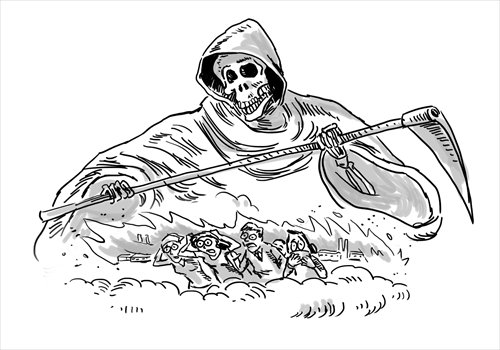Disasters focus attention on workplace safety

It's been a season of industrial disaster. This Monday, a fire at a poultry plant in Jilin Province killed 119 workers. On April 24, a garment factory building in Savar, Bangladesh collapsed, crushing 1,127 people to death. And on April 17, a fertilizer factory in the town of West in the US state of Texas exploded, killing 15 people and injuring 160.
The West disaster was the smallest in terms of lives, but in some ways also the most telling. It came just two days after the Boston bombings, which killed three people.
However, the marathon bombings received far more coverage than the West disaster, despite causing far fewer deaths and injuries. And the zoning issues which placed an explosive factory in a residential district received barely any attention, whereas page upon page was dedicated to the roots of the Boston terrorism.
Partially that's because of the spectacular and random nature of terrorism, which always draws headlines. But it also points to an uncomfortable truth; much of the time workplace injuries and deaths, especially when they come in ones and twos rather than a single cluster, are massively underreported by the media.
According to official statistics, believed to underreport the problem, over 75,000 people die in workplace accidents in China every year. Hundreds of thousands more are crippled or seriously injured.
And unlike terrorism, these deaths are easily preventable. They take place because of the callousness and penny-pinching of management.
The conditions in the Jilin fire eerily mirror those of the infamous 1911 Triangle shirtwaist factory fire in the US. In both factories, doors were barred from the outside in order to manage workers, preventing them from taking breaks or pilfering items.
Even more shockingly, the Jilin fire took place under the same conditions as China's last major factory fire. It took place in Zhili toy factory in Shenzhen in 1993, where management had locked the doors and barred the windows. Then, as now, Chinese law was clear on the need for fire exits. But the will to enforce that law hasn't been there, with officials all too willing to look the other way.
And here's the rub. Terrorism strikes equally; it can claim the lives of even elite students or top officials. But workplace disasters hit the poorest and the most powerless.
As officials face only two workplace hazards, alcoholism and obesity, a world of whirring machinery and cramped corridors is entirely foreign to them, though all too familiar to the country's migrant workers. The same goes for most of the middle class.
It's true that it's hard for newspapers to cover slow trends, rather than big events. But the focus on the urban middle class, and the gulf between the lives of office-bound, white-collar journalists and those of the workers on China's factory lines, make the grimly mounting death toll of Chinese workers each year almost invisible in the national press until a huge disaster strikes.
The same goes for the US. There the migrant workers aren't rural incomers, but Mexicans and other immigrants working in illegal conditions. With their work off-book, their deaths or injuries often go unreported, families paid off to avoid making trouble.
That, too, finds an echo in China, where the illegal coal mining industry is estimated to see hundreds of deaths annually that never make it into national statistics.
It's unfortunate that it takes 100 people dying in a day in one spot, rather than 6,000 dying in a month across the country, to prompt the media to action. But the coverage may yet pay off.
US factories are far safer than Chinese ones on average, partially because the Triangle fire prompted massive changes in US safety standards. This happened at a time when technologically and logistically the US was far below China today. Bangladesh's fury is sparking a mass reexamination of the country's labor conditions.
Will Jilin do the same, or will the response be as futile as that to the Zhili fire?
The author is an editor with the Global Times. jamespalmer@globaltimes.com.cn